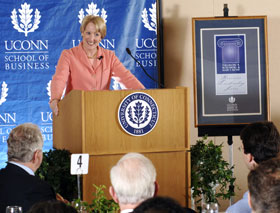Xerox CEO
Describes Company’s Turnaround
 |
| Anne Mulcahy, chief executive officer of Xerox Corp. speaks at a lecture on leadership at the Stamford Campus on April 1. |
|
Photo by Daniel Buttrey |
Anne Mulcahy, chairwoman of the board and chief executive officer of Xerox Corp., offered an insider’s guide to leadership to an audience at UConn’s Stamford campus April 1.
Mulcahy delivered this year’s Theodore R. Rosenberg ’55 and Mary F. McVay Business Leadership lecture.
She described management decisions she’s made since taking over in May 2000, that have brought the 60,000-employee global document management company out of the worst financial slump in its history.
“In 1998, we were doing well. Our market share was up, our stock was outperforming the market, things looked good,” she told an audience of alumni, business leaders, faculty, and students.
Then starting in 1999, as economies around the world began to weaken, “with alarming speed, business began to unravel,” she said. “Our competition got tougher and better, profits declined, we suffered our first quarter loss, debt mounted to $19 billion, our customer base was not pleased, and employees were leaving. It was about this time I was named president and CEO.”
“It’s amazing how fast things can break down and how tough it is to build them back up,” Mulcahy said.
She described her plan to restore the company’s financial position as “focused cash generation with discipline.” This entailed selling off non-core assets, cutting capital spending in half, reducing worldwide employment by one-third, “and making lots of really tough strategic moves on what we were good at and what we weren’t,” she said.
The results have been swift and positive, Mulcahy said. Xerox has enjoyed eight straight quarters of revenue growth, and doubled its equity to more than $14 billion.
By maintaining investment in research and development, the Stamford-based, Fortune 500 company has introduced 75 new products and services in the last two years, winning a share in key segments of the market, she said. These products and services now contribute nearly 75 percent of the company’s $16 billion yearly revenues.
“The combination of innovative technology and relentless pursuit of efficiency and productivity in our core business is key to where our position is today,” Mulcahy said. “The media were ready to write our obituary, but now there’s a lot of positive feedback in the press on our turnaround.”
Mulcahy began her career at Xerox as a field sales representative in 1976. She believes her 29 years with the company helped her in revitalizing the company. “As a lifer, in a time of crisis you know where to go,” she said. “Being an insider, you have embedded relationships that are a shortcut to building effective teams. I didn’t waste a lot of time getting people aligned.”
Mulcahy described a variety of traits that successful corporate executives share. She stressed the importance of being a good listener to both customers and employees. Next comes communication, she said: “This is all about the alignment of people around a set of objectives and having a sense of confidence the company can get there.”
Another important leadership trait, she said, is to know how to find appropriate balance when faced with disparate pressures.
Unapologetic about difficult choices she’s made in the cutthroat global business market, Mulcahy said dedicated Xerox employees understood that drastic measures were required so the company would “not go the way of Polaroid,” even when it had negative consequences for some of them.
Yet even with a dedicated workforce, Mulcahy said, “You can’t forget why the company exists – it’s the customer.” Xerox’s renewed commitment to its customer base led to the creation of “customer councils” that participate in the development of new products, she said. “We’ve taken our engineers out of their labs and into the customer work sites. They [customers] tell us what they need and what they are willing to pay for. It’s a path that has brought us out of trouble and built a good future for us.”
Mulcahy said to be successful, leaders should not become intoxicated with leadership. “Stay approachable,” she urged. “Surround yourself with a group of good critics. It’s the biggest gift you can get.”

